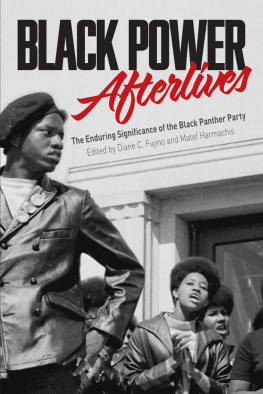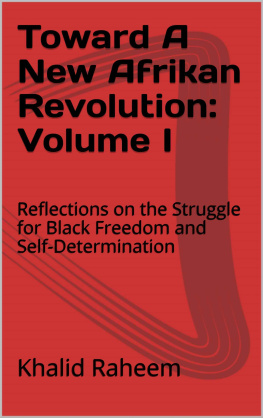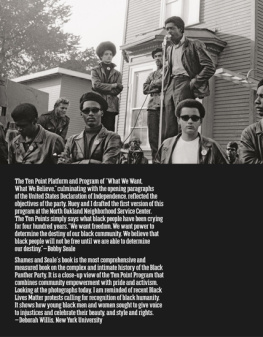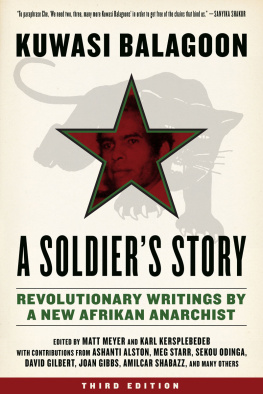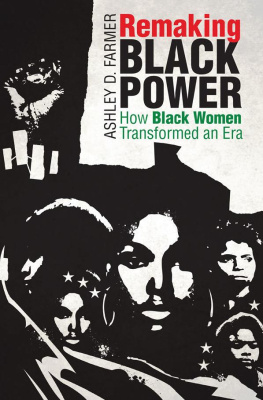Table of Contents
Escaping the Prism Fade to Black:
Poetry and Essays by Jalil Muntaqim
Escaping the Prism Fade to Black: Poetry and Essays by Jalil Muntaqim
ISBN 978-1-894946-81-0
Kindle edition published in 2015 by Kersplebedeb
Copyright Jalil Muntaqim
This edition copyright Kersplebedeb
Please note that artwork by Kevin Rashid Johnson, Zolo Agona Azania, Bec Young, Pete Railand, Nicolas Lampert, Rocky Dobey, and We Are the Crisis, which appeared in the print version of this title, has been omitted from the digital version.
To order copies of the book, contact:
Kersplebedeb
CP 63560, CCCP Van Horne
Montreal, Quebec
Canada
H3W 3H8
www.kersplebedeb.com
www.leftwingbooks.net
Also available from:
AK Press
674-A 23rd Street
Oakland, CA
94612
Voice: (510) 208-1700
Fax: (510) 208-1701
www.akpress.org
Since 1998 Kersplebedeb has been an important source of radical literature and agit prop materials.
The project has a non-exclusive focus on anti-patriarchal and anti-imperialist politics, framed within an anticapitalist perspective. A special priority is given to writings regarding armed struggle in the metropole, and the continuing struggles of political prisoners and prisoners of war.
All books and pamphlets published by Kersplebedeb are available from AK Press, Amazon, and Baker & Taylor.
Poetry Like Bread: The Necessity of Poetic Wholeness
by Walidah Imarisha
My poetry is not fairy tales
or lullabies or sing-a-longs,
Naw it is a rebuke of the
ostrich syndrome a swift kick
in the ass to make you stand up
straight and take responsibility
for your failures, demanding you
live life fully and love completely
Jalil Muntaqim, My Poetry
Political prisoner Jalil Muntaqims writing doesnt live in ivory towers, wrapped in elitism and dripping privilege. Jalil Muntaqims writing breaks the pedestal meant for it, sharpening the shards for survival.
Weaving together essay, analysis and poetry into one, his collection Escaping the Prism recognizes none of us is beyond critique and responsibility not even art. His work fulfills the edict by Salvadoran revolutionary poet Roque Dalton that poetry, like bread [be] for everyone.
A former Black Panther member, a consummate and continued freedom fighter, Jalil has spent more than two-thirds of his life in prison. Infused in his poetry is a sense of urgency as present as the need to free him; the clarity rings out, not shrouded in secrecy, but loud as a bomb. It echoes with the punishment he has suffered, the decades of his life stolen. It rings with his continued commitment to organizing even through iron bars and barbed wire, using any and all tools available to him.
Poetry has become part of his arsenal of justice, and Jalils work embodies the words of Martinique-born Afro-Caribbean revolutionary Frantz Fanon: I want my voice to be harsh, I dont want it to be beautiful. I dont want it to be pure I want it to be torn through and through
In his poem, My Poetry, Jalil closes by saying My poetry is my life, and it is absolutely life you will find in these pages. Gritty, complex, raw life. Life that was meant to be extinguished, stomped out by the entire weight of an oppressive system. But like Tupacs rose that grew in concrete, Jalils work and words, his humanity, his life, slips through bars.
This collection is not just about rebuke, but a commitment to living fully and loving completely. To exploring all aspects of humanity, all pieces that make up liberation. Many of the poems look at sex, at sensuousness, at humans joining flesh and sometimes hearts. Escaping the Prism flips seamlessly between poems about sexual pleasure, and political essays on incarceration, in such a way that the reader understands implicitly they are intimately connected. That this is human. His poems around desire, lust and longing also allow the reader to explore the complexities, convolutions and sometimes contradictions of masculinity, compressed by decades in a cell.
As Ward Churchill writes in his essay in this book, Jalils writing is absolutely born out of love. Some of the pieces, like For Zakia, are so imbued with conscious vulnerability, it makes the heart ache, this poem, written for a daughter who was in the womb when he was arrested, a daughter he has only known through bars.
Jalils writing, his case, his life, shows both the continuity of repression, but also the continuity of resistance. As part of their attempt to disrupt this continuity of resistance, governmental forces hoped to use prisons to smash a lineage of struggle that for Black people reaches unbroken back to the first attempted African enslavement.
Escaping the Prism defies the attempts of the state to silence political prisoners, to disconnect them from those on the ground working to create change. In the context of the international Black Lives Matter movement, this roar for justice led by Black youth, Jalils poetic voice, and the voices of all our political prisoners, are vitally necessary to continue the continuity of Black resistance.
Walidah Imarisha
May 2015
PART I
My Poetry
My poetry is sharpened knives
clipping thorns off roses
My poetry builds bridges over
lava flows to step in spring
streams
My poetry replaces hate with
understanding and puts sugar
in kisses
My poetry ravishes and plunders
the greedy to feed the needy
My poetry puts the hue in humanity
to consternation of racists
and xenophobes
My poetry puts the stink in
shit and makes you love the
stench
My poetry is the bastard son
of the hookers that satisfy your
husbands and boyfriends, and
some of your girlfriends
You know it is all about love
My poetry is not fairy tales
or lullabies or sing-a-longs,
Naw it is a rebuke of the
ostrich syndrome a swift kick
in the ass to make you stand up
straight and take responsibility
for your failures, demanding you
live life fully and love completely
Even when I procrastinate to write
my poetry
My poetry puts the puzzle in an
enigma, like a Rubiks Cube, you
have to twist your mind to discover
a solution
My poetry put the Pan in Doras
box, and swallowed the key to
keep it locked
My poetry has a chip on its
shoulder bigger than the heads
on Mount Rushmore
My poetry is the calm before the
storm, and the silence in the dark
My poetry is the hypnotists trance
and the enlightenment of an epiphany
My poetry only asks for your
ear to open your mind so
your heart will hear my
poetry tantalizing your
soul
My poetry is my life
AMERICA IS A PRISON INDUSTRIAL COMPLEX
(Statement from Jalil Muntaqim read at Occupys National Day of Support of Prisoners, San Quentin, February 20, 2012.)
The 2.3 million U.S. citizens in prison represent more than a problem of criminality. Rather, the human toll of the U.S. prison industrial complex addresses and indicts the very foundation of American history.
Given this reality, the struggle to abolish prisons is a struggle to change the very fabric of American society. It is a struggle to remove the financial incentive the profitability of the prison/slave system. This will essentially change how the U.S. addresses the issue of poverty, of ethnic inequality, and misappropriation of tax dollars. It will speak to the reality that the prison system is a slave system, a system that dehumanizes the social structure and denigrates Americas moral social values.
The prison system today is an industry that, as did chattel slavery, profits off the misery and suffering of other human beings. From politicians to bankers to the business investment community, the prison industrial complex is a multi-billion dollar criminal enterprise, all of which has been sanctioned by the Thirteenth Amendment of the U.S. Constitution.
Next page


